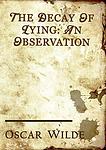Oscar Wilde
Oscar Wilde was a renowned Irish playwright, novelist, essayist, and poet known for his barbed wit, flamboyant style, and brilliant conversational skills. Born on October 16, 1854, in Dublin, Ireland, he became one of London's most popular playwrights in the early 1890s. Wilde is best remembered for his novel 'The Picture of Dorian Gray', his plays, including 'The Importance of Being Earnest' and 'An Ideal Husband', and his tragic imprisonment and early death. His literary work and life continue to fascinate and influence writers and audiences around the world.
Books
This list of books are ONLY the books that have been ranked on the lists that are aggregated on this site. This is not a comprehensive list of all books by this author.
-
1. The Picture of Dorian Gray
The novel follows the life of a handsome young man who, after having his portrait painted, is upset to realize that the painting will remain beautiful while he ages. After expressing a wish that the painting would age instead of him, he is shocked to find that his wish comes true. As he indulges in a life of hedonism and immoral acts, his portrait becomes increasingly grotesque, reflecting the damage his actions have on his soul. The story serves as a cautionary tale about the dangers of vanity, selfishness, and the pursuit of pleasure without regard for consequences.
-
2. The Importance of Being Earnest
This comedic play revolves around two protagonists who both use the pseudonym "Ernest" to escape their social obligations. Their plans unravel when they fall in love and their betrothed women reveal they are only willing to marry men named Ernest. The situation is further complicated by a case of mistaken identity, a lost handbag, and a surprising revelation about one of the protagonist's parentage. The play uses wit and humor to satirize the social conventions of Victorian England, particularly the importance placed on trivialities.
-
3. De Profundis
"De Profundis" is a lengthy letter written by a man during his imprisonment for gross indecency, reflecting on his past life and experiences. The letter is addressed to his former lover, and through it, he expresses his feelings of regret, despair, and hope. The man discusses his spiritual journey during incarceration, his newfound understanding of suffering, and his changing views on art and morality. The work is a profound exploration of love, forgiveness, redemption, and the human spirit's resilience.
-
4. The Complete Fairy Tales Of Oscar Wilde
This collection brings together all of Oscar Wilde's enchanting fairy tales, showcasing his wit, moral vision, and penchant for the fantastical. Through stories that range from the whimsical to the tragic, Wilde explores themes of love, sacrifice, compassion, and the human condition. His tales, including well-known ones such as "The Happy Prince" and "The Nightingale and the Rose," are imbued with the lyrical quality and poignant insights for which Wilde is celebrated. Written with a blend of childlike wonder and profound depth, these stories appeal to both young readers and adults, offering a glimpse into Wilde's literary genius beyond his famous plays and novel.
-
5. Essays Of Oscar Wilde
This collection of essays showcases the sharp wit and insightful social commentary of one of the most celebrated writers of the late 19th century. The essays span a range of topics, from art and aesthetics to criticism and personal reflections, all delivered with the author's distinctive blend of eloquence and irony. The author's keen observations on Victorian society, his exploration of beauty and its relation to life, and his thoughts on the role of the artist make this compilation a treasure trove for readers interested in literature, philosophy, and the enduring complexities of human nature.
-
6. Plays
This collection of works by a renowned 19th-century playwright is a brilliant exploration of social satire, wit, and the examination of Victorian society's norms and hypocrisies. The plays within often feature sharp dialogue, complex characters, and intricate plots that challenge social mores and personal morality. Themes such as the superficial nature of social status, the conflict between true love and societal expectation, and the duality of human nature are woven throughout these comedic yet thought-provoking dramas. The author's clever use of language and paradox, along with his critique of aristocratic attitudes, ensure that the plays remain enduring favorites on the stage and continue to engage readers and audiences with their timeless relevance and humor.
-
7. The Wit Of Oscar Wilde
This book is a curated collection of Oscar Wilde's most memorable and witty remarks, drawing from his plays, essays, and personal letters. It showcases Wilde's sharp wit and unique perspective on society, art, morality, and life itself. Through his clever use of language and insightful observations, Wilde's humor and intelligence shine, making this compilation a delightful exploration of the mind of one of literature's most celebrated figures. The selection not only entertains but also offers a glimpse into the complexities and contradictions of human nature, as seen through the eyes of a master wordsmith.
-
8. The Complete Letters Of Oscar Wilde
This compilation is an exhaustive collection of correspondence penned by one of the most celebrated writers of the Victorian era, known for his wit, eloquence, and flamboyant style. The letters provide an intimate glimpse into the author's life, covering his rise to fame, his relationships, his trials, and his time in prison. They reveal his personal thoughts on art, literature, society, and his own creative process. The collection is not only a treasure trove for literary enthusiasts and scholars but also a poignant, revealing portrait of a complex man who was a central figure in the aesthetic movement of the late 19th century.







